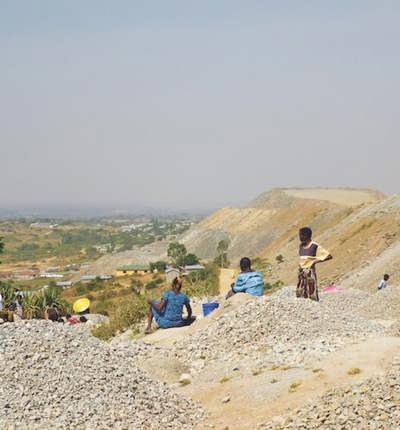
Legal action served against London Bullion Market Association following alleged human rights abuses at Tanzanian gold mine
A legal case has been served on the London Bullion Market Association (LBMA) alleging that it is wrongly certifying gold from a mine in Africa as being free from serious human rights abuses. The LBMA oversees the vast London gold market, the largest in the world.
Posted on 15 August 2023
The legal issues raised by this case centre on whether a certification body, like the LBMA, can be held legally responsible for a flawed certification process which causes or contributes to ongoing human rights abuses.
The claim, filed in the High Court in London in December 2022, has now been served by the families of two artisanal miners. The miners were killed in 2019 while prospecting for gold at the North Mara Gold Mine in Tanzania. Both were 23 years old at the time of their deaths.
The mine is majority-owned by Canadian multinational Barrick Gold Corporation, one of the world’s largest gold mining companies. Both individuals’ names have been anonymised to protect their families.
The service of the claim on the defendants means that a detailed Particulars of Claim, the document setting out the families’ case, has been provided to the LBMA and lodged with the High Court in London. In response, the LBMA have indicated an intention to challenge whether the English courts are the right place for the case to be heard.
The claimants allege that the LBMA was wrongly certifying that gold sourced from the mine was untainted by serious and widespread human rights abuses. At the time of the claimants’ deaths the LBMA continued (and continues today) to certify gold sourced from the mine as “good delivery” gold under its “Responsible Gold” standard. This is despite the mine being associated with a widely reported pattern of systematic human rights abuses over many years.
Instead, it is argued in the legal claim, the LBMA should have followed its own rules and sanctioned the refiner by suspending or removing it from the LBMA’s Good Delivery List.
By issuing its Responsible Gold certificate, the LBMA is verifying to the market and general public that (1) gold refined from the mine constituted “Good Delivery” gold which was responsibly sourced and (2) that the refiner was complying with the LBMA’s Responsible Gold Guidance.
Only “Good Delivery” gold is free to be traded on the London bullion market, with around US$275 billion being traded in London each week. The families argue that a certifying body, like the LBMA, owes a duty of care to victims of human rights abuses following a failure to properly enforce its own policies and guidelines.
The effect of removing LBMA accreditation and its Responsible Gold Certificate would, the claimants argue, be commercially and reputationally disastrous for the refiner and would have forced the mine to finally put a stop to the systematic human rights abuse of artisanal miners. If this had happened, the families believe that ZZZ and ZZY would still be alive.
ZZZ was killed in July 2019 after entering the mine to prospect for gold. His family allege he was violently assaulted by security guards and/or Tanzanian police officers assigned to provide security at the mine. ZZZ suffered a gunshot wound which caused a compound fracture of his tibia/fibula and he died from a loss of blood.
ZZY was killed in December 2019. His family allege that he had been prospecting for gold at a tailings (waste material) site before Tanzanian police officers arrived and opened fire with live ammunition and tear gas. ZZY was shot in the back and died from his wound.
Wider reporting of the issues at the Mine
There is a long and troubling history of allegations of systemic human rights abuses committed against local people in and around the mine. Various NGOs have reported on over 100 killings or incidents of serious violence, such as torture, linked to the mine between 2009 and 2022, as well as numerous allegations of police abuse around the mine.
These allegations have resulted in three legal actions being commenced by Tanzanian nationals against Barrick Gold or its subsidiaries in English or Canadian courts. The first was filed in English courts by Leigh Day in 2013. The second was also filed in English courts in 2019, and the third was filed in Canadian courts in 2022.
Civil society groups, including RAID, Global Witness and SWISSAID, have repeatedly raised concerns regarding the failure of the LBMA’s Responsible Sourcing programme to curtail human rights abuse and illicit gold in supply chains. In 2020 and 2022, corporate watchdog RAID filed detailed submissions with the LBMA, urging it to stop the trade in tainted gold from the North Mara mine.
Daniel Leader, partner at Leigh Day, said:
“Serving this case against the London Bullion Market Association in the High Court is an important step forward in our clients’ fight for justice. Certification bodies should never be used as a smokescreen to cover up serious human rights and environmental abuses. It’s time for the LBMA to be held to account for allowing gold tainted by alleged human rights abuses to be traded freely in London.”
Alex Wessely, senior associate at Leigh Day, added:
“Despite reports of serious human rights violations at the North Mara mine, the LBMA has continued to issue a ‘Responsible Gold Certificate’ to the company which refines the gold. This has allowed gold from the mine to access the London gold market, which is the largest in the world. Our clients strongly believe that if a certification body is effectively allowing human rights abuses to continue, they must be held to account.”

